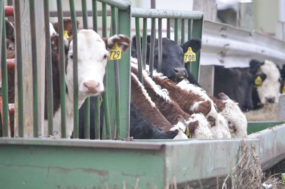“Our policy committees are tasked with a broad spectrum of issues, with everything from environmental regulation to nutrition policy to trade barriers on the agenda,” said Bob McCan, NCBA president and Victoria, Texas, cattle producer. “Cattle producers gather from across the country to discuss the biggest issues facing the cattle industry right now and make specific decisions on how to move forward on these priorities.”
Along with revisions to current policies, NCBA members analyzed the overall state of the industry in one-on-one discussions with top government representatives, trade officials and other industry leaders.
“Right now, priority issues include the EPA’s proposed waters of the United States rule, tax reform and ongoing international trade issues,” said NCBA Vice President of Government Affairs Colin Woodall. “We are engaged in a long list of policy priorities all year long. After the meetings in Denver, NCBA’s D.C. staff is headed back to Washington, ready to hit the ground running with the list of recommendations and policy updates.”
In the Property Rights and Environmental Management Committee, members passed a resolution to lead the development of a beef sustainability program, inclusive of the beef value chain and stakeholders, that addresses the continued advancement in areas such as economic viability, production efficiencies, animal care and handling, environmental conservation, human resources and community support.
The Cattle Marketing and International Trade Policy Committee passed a resolution for NCBA to support changes to mandatory price reporting. Accurate and detailed market information is imperative for sound decision making, and the directive calls for support of changes to ensure the data reflects the market place.
And NCBA’s Cattle Health and Well-Being Committee passed policy regarding foreign animal diseases, which could cause a widespread quarantine and possible massive depopulation of the U.S. cattle herd, thus compromising national security and jeopardizing the U.S. beef supply. As such, a resolution was passed to oppose the importation of live cattle, beef and beef products into the U.S. from foreign countries with histories of significant chronic animal diseases and lack of strict animal disease control and eradication measures.
Further, NCBA urges USDA to include U.S. cattle industry stakeholders in any negotiations with foreign countries relating to efforts that may affect the health of the U.S. cattle industry and provide the U.S. cattle industry opportunities to comment on new procedures for developing risk analyses for any foreign country with significant chronic animal disease issues wishing to export live cattle, beef and beef products into the U.S.
USDA protocols should be substantiated by sound, scientific evidence and that animal health related regulations not be used as non-tariff trade barriers.
All of these policies from the committees were passed by the full NCBA board of directors.
The official NCBA policy book is a detailed compilation of policy priorities on cattle industry issues. The full NCBA 2014 policy agenda can be found online at: www.beefusa.org. ![]()
—From NCBA news release







